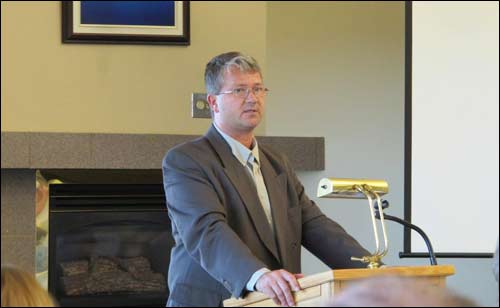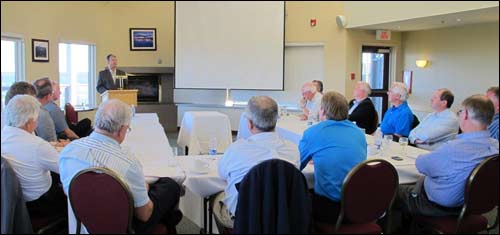|
SPEAKING NOTES <<Check Against Delivery>> I want to begin by thanking you for the opportunity to bring a few greetings this evening, and provide some comments on the provincial fishery and processing sector. Since becoming Minister of Fisheries and Aquaculture in October of last year, in the words of Craig Dobbin, it has been �one hell of a ride!� However, it is a ride that I am thoroughly enjoying. I feel honoured to serve in this portfolio, and I am optimistic that the decisions I make will be a strong contribution to the future of this vital industry. As Minister, I have observed very quickly that the fish processing sector is evolving. Plant closures are a sure sign of the times, as resource opportunities change and regional challenges occur. There is hope, however, as the global demand for seafood continues to increase. Opportunities do in fact exist. Everything is not doom and gloom � the people in this room attest to your commitment and confidence, undoubtedly. The world trade in fish products set a new record in 2011. Export value increased 17 per cent to $127 billion in US currency, mainly due to higher prices on fish commodities. Strong demand in Asia, high import dependency in the US and the EU, but also buoyant demand from emerging markets underpinned the rise in prices. The Food and Agriculture Organization predicts that from now to 2015, seafood consumption will increase annually, per capita, worldwide, and total demand for seafood products will increase. My point is, the world will not have enough fish and prices will increase. This is indeed positive news. Shrimp, snow crab, cod, lobster, pelagics, flounder, and others will continue to be our mainstay, and continue to have the potential to provide enormous economic benefit to your operations, our communities and indeed the entire province. We must continue to work together to ensure we capitalize on every opportunity as they arise. In a little over 11 months, I have visited more than a dozen fish processing plants throughout the province. From Allen�s Fisheries in the Bay of Islands, the Barry Group in Corner Brook, the Labrador Shrimp Company in Mary�s Harbour, to the Quinsea plant in Old Perlican, one thing I have observed is the willingness of processors to adapt and reorganize their operation to address market demands, and capitalize on emerging opportunities. This is happening through, for example, a commitment to innovation and new technologies.
The industry is changing, and I take comfort in knowing that with the cooperation of government and all stakeholders, we continue to take advantage of our resource for the benefit of everyone.
Still, challenges exist, and the future will need leaders that recognize this reality, and work hard to bring about a new processing ability that focuses on a changing global market, while providing longer-term meaningful employment for harvesters, processors and seafood marketers.
To help the industry, our government continues to strategically invest in the areas of the fishery that are within our jurisdiction. For example:
Each one of these investments is extremely important for us collectively (government and industry) to foster an industry that delivers to shareholders, communities, and individuals alike.
We will also continue to work with the Federal Government to secure fish resources for the benefit of Newfoundland and Labrador. Our commitment, and the commitment of Premier Dunderdale, is to maximize the benefit of our fish resources to the province. To achieve a sustainable, economically viable, and internationally competitive and regionally-balanced seafood industry, we must:
Each of these outcomes is attainable if we work together.
Pursuing a new direction may mean dramatic transformation over time. It must be an integrated approach. It will require a high level of management and effort to shape outcomes.
But I am confident in saying that the gap between where we are versus where we want to be in not that far apart, and I think industry (and your members in particular), are ready for change.
My personal commitment is strong, and the commitment of our government under the leadership of Premier Dunderdale, is also solid.
Thank you again for the opportunity, and I look forward to continuing our work together in the future.
Thank you.
Fisheries and Aquaculture Minister King speaking with members of the Association of Seafood Producers at the Admiral's Green Clubhouse, Pippy
Park, St. John's, September 12, 2012. |
|
|
|
All material copyright the Government of Newfoundland and Labrador. No unauthorized copying or redeployment permitted. The Government assumes no responsibility for the accuracy of any material deployed on an unauthorized server. Disclaimer/Copyright/Privacy Statement |






